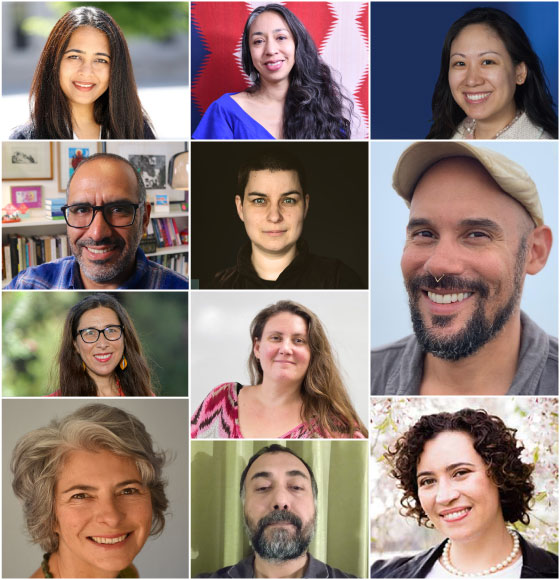September 7, 2022—Data & Society (D&S) is pleased to announce the inaugural cohort of the Scholars Council, a group of experts who study technology and data’s role in society and who will help the organization chart a path forward in its research. The council of eleven members is coordinated by Director of Research Jenna Burrell and will provide feedback on D&S research-in-progress, provide mentorship to early career scholars, and take part in exploratory discussions aimed at rethinking research practice, developing new research areas, and advancing existing ones.
“The Scholars Council is the best kind of advisory board, comprised of experts we can learn from and with,” said Burrell. “I’m so thrilled to welcome these brilliant scholars and look forward to collaborating in ways that are mutually enriching.”
The Scholars Council members were selected based on their experience conducting and publishing research on data-driven technology, the alignment of their topics of focus with D&S’s research agenda, and their innovative practices of research practice and dissemination.
Members of the council will serve for two years starting this summer. They will receive an annual honorarium and will be appointed D&S affiliates after their term ends.
Scholars Council members represent disciplines including anthropology, technology, data, and information, and a range of higher education institutions. The members are:
Chinmayi Arun is the executive director of the Information Society Project at Yale Law School. Her research focuses on platform governance, social media, algorithmic decision-making, the data economy, and privacy, within the larger universe of questions raised by law’s relationship with the information society. She is interested in how these questions affect marginalized populations, especially in the majority world.
Meredith Broussard is an associate professor at NYU’s Arthur L. Carter Journalism Institute; research director at the NYU Alliance for Public Interest Technology, and the author of several books including Artificial Unintelligence: How Computers Misunderstand the World and the forthcoming More Than a Glitch: Confronting Race, Gender, and Ability Bias in Tech. Her academic research focuses on artificial intelligence in investigative reporting and ethical AI, with a particular interest in using data analysis for social good.
Stephanie Russo Carroll is an assistant professor in Public Health and American Indian Studies at the University of Arizona, and affiliate faculty in the College of Law. She is also acting director and assistant research professor at the Udall Center for Studies in Public Policy, and associate director of the Native Nations Institute. Stephanie’s interdisciplinary research group, the Collaboratory for Indigenous Data Governance, develops research, policy, and practice innovations for Indigenous data sovereignty. Her research, teaching, and engagement seek to transform institutional governance and ethics for Indigenous control of Indigenous data, particularly within open science, open data, and big data contexts.
Marisa Duarte is an associate professor with the program of Justice and Social Inquiry at the School of Social Transformation at Arizona State University. Her research focuses on Indigenous approaches to information, knowledge, and technology, and decolonial approaches to digital infrastructures toward social change.
Margaret Hu is a professor at William & Mary Law School and founding director of the Digital Democracy Lab at William & Mary. Her research interests include the intersection of national security, cybersurveillance, and AI and civil rights.
Max Liboiron is the founder and director of Civic Laboratory for Environmental Action Research and associate professor at Memorial University. They develop and promote anticolonial research methods in a wide array of disciplines and spaces.
Jeanna Matthews is a professor of computer science at Clarkson University and founding chair of the ACM Technology Policy Subcommittee on Artificial Intelligence and Algorithmic Accountability. She has published work on a broad range of systems topics from virtualization and cloud computing to social media security.
Shaka McGlotten is a professor of media studies and anthropology at Purchase College – SUNY, where they also serve as chair of the Gender Studies and Global Black Studies programs. An anthropologist and artist, their work stages encounters between Black study, queer theory, media, and art. They have written and lectured widely on networked intimacies and messy computational entanglements as they interface with QTPOC lifeworlds.
Deirdre K. Mulligan is a professor in the School of Information at UC Berkeley, a faculty director of the Berkeley Center for Law & Technology, and a co-organizer of the Algorithmic Fairness and Opacity Working Group. Mulligan’s research explores legal and technical means of protecting values such as privacy, freedom of expression, and fairness in emerging technical systems.
Joyojeet Pal is an associate professor at the University of Michigan’s School of Information. His research focuses on the ways that access to technology impacts social interactions in the Global South. Joyojeet’s work examines how political parties connect on social media, build networks of influence, and spread propaganda.
Juan Pablo Pardo-Guerra is an associate professor in sociology at UC San Diego and is founding faculty at the Halıcıoğlu Data Science Institute. His work focuses on markets, infrastructures, quantification, and data.
Read the members’ full bios here.


